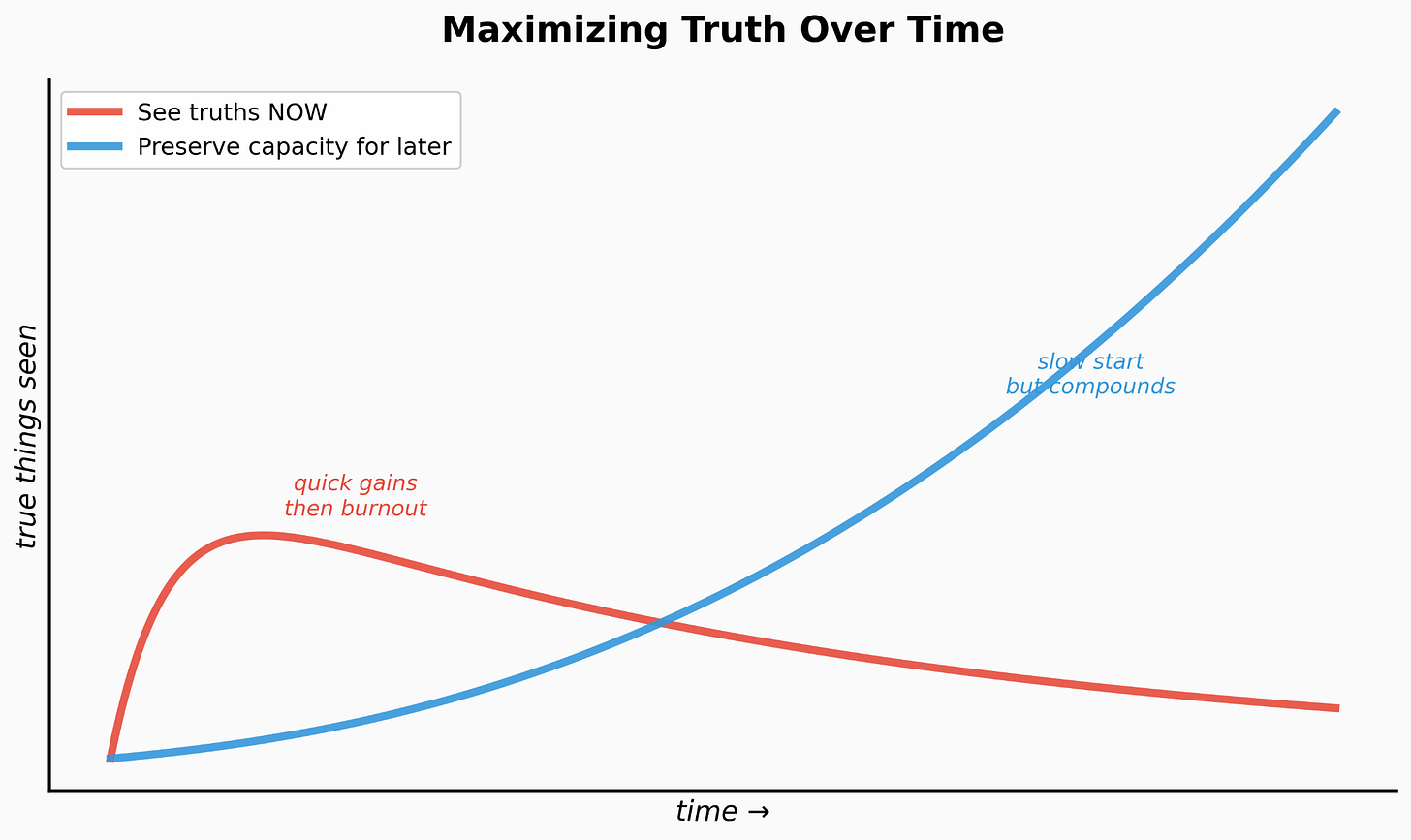[Interregnum:] Visa’s dictum
“Focus on what you want to see more of”
Yesterday’s post ended on an upsetting note. Speaking of upsetting, let’s talk about Visakan Veerasamy a/k/a “Visa”.
Perhaps you’re familiar with Alicorn’s 2015 Rationalism Gothic:
You utter a statement. Someone says, “Yet. Growth mindset.” This happens more and more. If you are very careful in your phrasing, you may hear, “So far,” instead. You speak in soft whispers, alone. Pessimistically. “Yet,” says a voice. “Growth mindset.” Silently, in a deserted office, you say nothing. “Growth mindset,” says the voice. Louder. It is growing.
In my story, that “someone” is Visa . Every time I got Mad Online, Visa would jump out of the Twitter bushes with the same maddening line: ‘Focus on what you want to see more of.’ Dreary.
“Dreary”? Yes. You see, I came across Alicorn’s “Rationalism Gothic” very late into my rationalism journey. By that time I had already long devoured the Sequences, and set my heart on adhering to the Twelve Virtues of Rationality, like that of “Surrender[ing] to the truth as quickly as you can”. Which is why his advice felt the same as someone asking me to shapeshift into this:
Not meMy head was already deep into the rationalist ostrich rabbit-hole. And while it was the second arguably-religious hole I fell into, it wasn’t the last.
Buddhism
I’m into Buddhism. Big time. Long story but I can promise you it very much followed from the first and sixth virtues—namely, “curiosity”, and “empiricism”.
In Buddhism there is this idea of “protecting the senses” or “guarding the sense doors”. The idea is to prevent you from getting swept away by craving (desperately wanting something) or aversion (desperately wanting away from something) upon perceiving it.
They call it “indriya-saṃvara” meaning “sense restraint” and it’s sorta like what we’d call attention hygiene: being mindful of what you’re paying attention to, what effects it causes in you, and so on.
The twist is that in Buddhism “senses” refers not just to our Western 5 senses, but also includes “mind” or the “mind-sense” as a further 6th sense, on the same level with Seeing, Hearing, Smelling, Tasting, Touching, “Mind-ing” [Apologies for the clunky construction but naturally we don’t have a natural verb form like we do for the other senses in English]
Senses in the West vs. Senses in Buddhism (btw if someone has a better depiction for the mind sense than a brain icon I’d appreciate it.)
Now, Buddhism was the most recent arguably-religious hole I fell into. But it wasn’t the one I was born into.
Christianity
Christianity, the tradition I was born into, boasts a whole “psychology of sin”. Before I go further let me address that word—”sin”—for I know how triggering it can be.
“Sin” is often thought of as being about “breaking arbitrary rules”. This is a modern misconception derived from the paucity of our theology.
The New Testament word for sin—”hamartia”—literally means “to miss the mark.” “Sin” does not describe something prescriptive, in the form of random rules you’re not meant to break but, rather, something descriptive, namely: the act of going against the grain of reality.
Moral teachings, thus, aren’t random divine decrees but rather maps of reality and how it works. “Sin” is a big sign in the map saying “IF YOU GO DOWN THIS PATH YOU’LL FUCK UP YOUR WHOLE LIFE.” Or, as St. Augustine more elegantly put it: “The punishment of every disordered mind is its own disorder”.
“[Act] is a sin.” is, therefore, an empirical claim: engaging in [Act] will deterministically make your life worse.
Ok, with that out of the way, let’s return to the psychology of sin. In Christianity sin exists on a descending ladder of how deeply you engage in it, with each step on that ladder reliably fucking up your life and mind further and further. (This is a further empirical claim.)
The steps on that ladder go as follows:
Suggestion (Temptation) — a sinful thought or image appears; not yet sin;
Delight — you linger on or take pleasure in the thought;
Consent — you inwardly agree or decide you would do it;
Action — you carry it out in word or deed;
Habit (Vice) — repetition forms a lasting disposition toward that sin.
I’m sure you, too, find this fascinating but by now you must be wondering why you should care. Well, here’s why: I want you to consider that both Christianity and Buddhism can be understood as empirical, proto-sciences of… “humaning”, for lack of a better term.
These “sciences of humaning” attempt to answer questions like “How can I lead a good life?”, “How can we uproot suffering?”, “How can we experience unconditional happiness?” or even, “What leads to union with God?”. They’re sciences in that they consist of disciplined experimental study. Just a bit unconventional in that they study inner life and only care about prediction insofar as it enables transformation. “Sciences of humaning” is a very clunky name too, of course. A much better name would be “Sciences of the Soul”.
The “soul” being what distinguishes a human from a robot. A robot is but a look-up table of inputs and outputs; a human is an “ensouled” being—one changed by what it does, and by what it attends to. Put differently: you are not a robot.
Conclusion
You are not a robot: what you attend to changes what your mind is drawn to and generates.
You are not a robot: looking at true things now affects your capacity of looking at true things in the future—just think about all the EAs/Rationalists that “burned out” and develop mysterious psychosomatic ailments that conveniently gave them moral license to stop focusing on truths that are hard to look at while keeping their identity intact.
You are not a robot: you have an ego, an identity. Some updates hurt, they’re triggering, even overwhelming.
And all of this is okay.
You are not yet able to engage with every true thing. And that’s okay. It’s why I tried to proactively defuse the “sin” trigger earlier. It’s okay. According to Christianity, you are fallen, and it’s okay. According to Buddhism, you are ignorant, and it’s okay. You don’t have to already be what you are not yet. You don’t have to already be what you are not yet.
I should say it: I very much still hold dear the value of looking at and knowing the true things. But I’ve made my peace with the fact that the cost of seeing some more true things now is to not see further true things later on and so, I’ve decided to maximize my truth capacity over time instead.
Thinking that you are or should already be that which you aren’t yet is what Christianity would call the sin of arrogance. You need (epistemic) pacing—a kind of (epistemic) humility.
For my visual learners out there.
In sum: let your eyes adjust before you stare into the abyss. There’s no rush—the abyss isn’t going anywhere. And for now, enjoy the sunshine.
Anyways, Visa was right.


